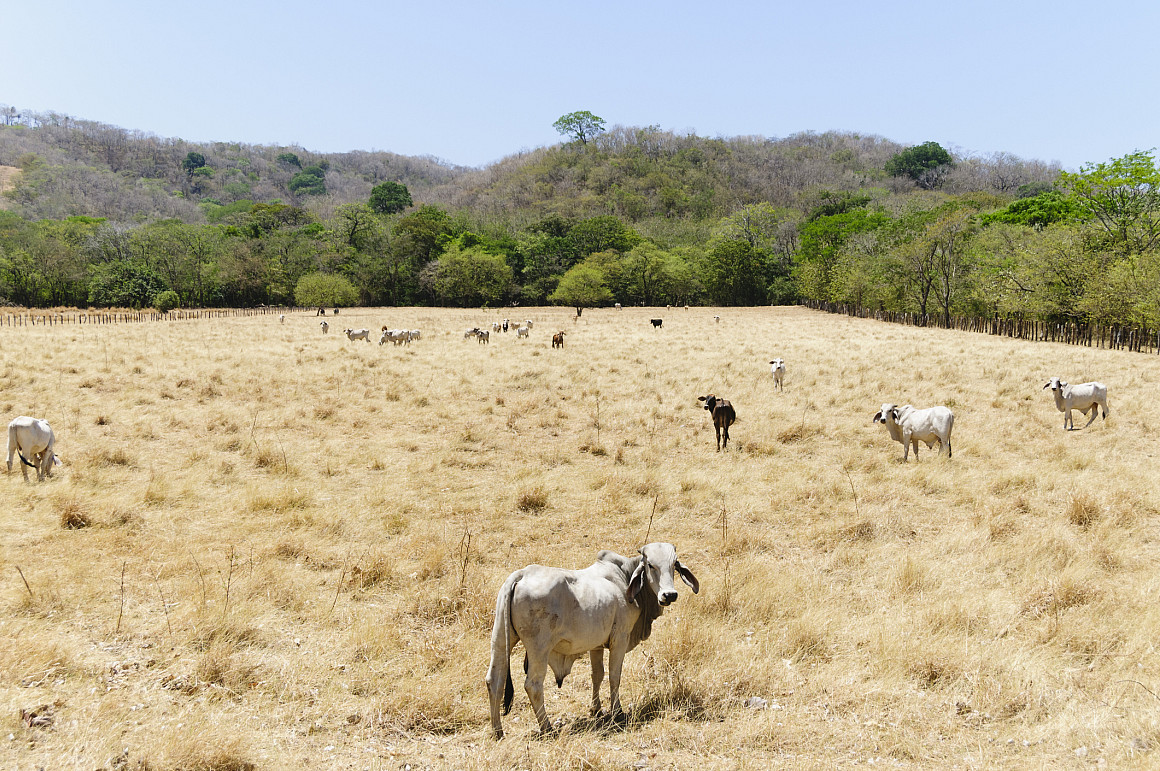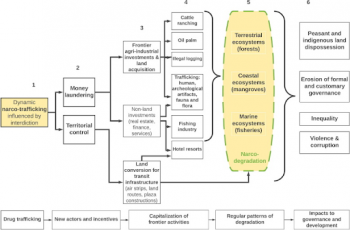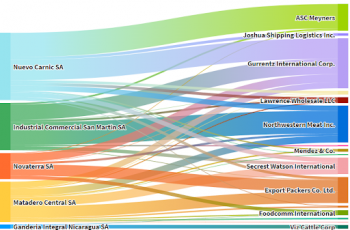main content Cash Cows: Narco-Ranching is Bigger Than You Think

The horrific societal effects of drug trafficking are familiar to even the most casual observer. One can hardly watch the news or turn on Netflix without being exposed to tales of violence and corruption at the hands of drug trafficking organizations (DTOs), to say nothing of the pain and desperation associated with addiction. Still, to many people, the ills of drug trafficking may appear limited to its active participants: DTOs waging internecine war over markets, corrupt politicians providing cover, and consumers using illegal drugs.
Or so the story goes. In fact, the harms flowing from drug trafficking and its participants are far more wide-ranging.
One of the troubling spillover effects of drug-trafficking is “narco-ranching.” If you’ve never heard of narco-ranching, you’re not alone. Despite its prevalence, its ill effects are not widely known. In some parts of Central America, DTOs exploit loosely regulated cattle markets to launder money from drug trafficking and gain control of strategic territory. Along the way, indigenous peoples and local communities suffer violence and dispossession of land; forests are cleared at unprecedented rates; the illegally harvested timber is trafficked; and, last but not least, untold numbers of cows suffer a cruel system of exploitation. What’s more, because the global beef market lacks a reliable traceability system, consumers of beef, perhaps even in the U.S., unwittingly contribute to these problems through their purchasing decisions.
An Introduction to Narco-Ranching
Narco-ranching is essentially what it sounds like: cattle ranching by DTOs or DTO-funded actors. Narco-ranching’s defining characteristics include illegal clearing of land and replacing the vegetation with cattle ranches, airstrips, and roads.
In these scenarios, cattle ranching serves as a cover and a means to multiple ends, including money laundering, territorial control, and logistical benefits.

Narco-ranchers have concluded that the cattle-ranching business is ideal for money laundering because regulations in Central America do not require receipts for the purchase and sale of cattle within the region. As a result, DTOs can use their drug money to purchase cattle and ranching equipment in bulk with untraceable funds. They later sell their fattened cattle to buyers in the beef market in nearby Mexico, where receipts are provided. The opportunity for receipt-free cash purchases at the front end in Central America, combined with receipt-producing sales in Mexico, makes for an ideal laundering mechanism. DTOs wash dirty cash, while making an additional profit off the cattle in the process.
In at least some cases, DTOs also use cattle as drug mules. DTOs take their cows across smuggling routes and borders, packing drugs in their reproductive organs and other body cavities.
The U.S. Contribution to Narco-Ranching
As disturbing as it sounds, U.S. beef consumers may be unwittingly facilitating narco-ranchers through their purchasing choices. The U.S. relies heavily on Central America’s beef production; it is possible that narco-cattle enter the U.S. beef supply. About two-thirds of Nicaragua’s beef export alone ends up in U.S. markets. Unbeknownst to U.S. beef consumers, even beef labeled “Product of the USA” may have been imported from Central America, and its precise provenance is frequently unknowable.

Take, for example, the distinction between indirect suppliers and direct suppliers. Direct suppliers are cattle ranchers who enter into legal contracts with major meatpackers. Indirect suppliers, on the other hand, are independent ranchers, including narco-ranchers, that sell their cattle to direct suppliers, who then sell the cattle, often mixed with their own cattle, to the slaughterhouse. This multi-layered process means that indirect suppliers are virtually invisible to meatpackers. In fact, cattle can be sold multiple times among legal and illegal ranchers prior to reaching a direct supplier that transports the cattle to a slaughterhouse. The result is that U.S. beef firms may not really know where their beef is coming from. For retail purchasers, the uncertainty is only magnified.
Conclusion
Narco-ranching has far-reaching effects. From the displacement of local communities, to deforestation, to the sale of meat to foreign consumers who would be shocked to learn that their purchases may be facilitating the laundering of drug money, narco-ranching underscores the staggering breadth and diversity of problems associated with the international trade in illegal drugs. For those laboring under the illusion that the drug trade primarily affects only its active participants, narco-ranching serves as a wake-up call. Quite apart from the more familiar costs of addiction, violence, and corruption, DTOs, through narco-ranching, wreak havoc on forests, local communities, and animals—all of which deserve far better.
To be sure, like most issues surrounding the illegal trade in drugs, identifying solutions to narco-ranching is hardly simple. Yet one step that would both deprive narco-ranching of oxygen and ameliorate its harms stares us in the face: adopting a plant-based diet. NGOs and activists already calling for a reduction in meat consumption—for reasons of animal welfare, climate change mitigation, or otherwise—ought to highlight narco-ranching as yet another reason to reduce or eliminate the consumption of beef.
***
This blog was written by International Animal and Environmental Law Clinic students, Lina Rodriguez Lancheros and Sarah Miranda, working with Clinical Professor, Erica Lyman, Director of our Global Law Alliance for Animals and the Environment (GLA) and Nicholas Fromherz, Adjunct Professor and GLA’s Latin American Program Director. GLA was launched in the fall of 2020 as an innovative collaboration of the world-renowned Center for Animal Law Studies and the #1 ranked Environmental Law Program at Lewis & Clark Law School.



The Center for Animal Law Studies (CALS) was founded in 2008 with a mission to educate the next generation of animal law attorneys and advance animal protection through the law. With vision and bold risk-taking, CALS has since developed into a world-renowned animal law epicenter, with the most comprehensive animal law curriculum offered anywhere. In addition, CALS is the only program that offers an advanced legal degree in animal law (both in person and online) and three specialty Animal Law Clinics. CALS is a fully self-funded nonprofit organization operating under the Lewis & Clark College 501(c)(3) tax-exempt status, and is only able to provide these educational opportunities through donations and grants.
Center for Animal Law Studies is located in Wood Hall on the Law Campus.
MSC: 51
email cals@lclark.edu
voice 503-768-6960
Center for Animal Law Studies
Lewis & Clark Law School
10101 S. Terwilliger Boulevard MSC 51
Portland OR 97219
More Stories

Manure Biogas is All Hat and No Cattle
Miranda Herreid, a JD student in the Farmed Animal Protection Project, breaks down why manure biogas is not the solution and will further entrench factory farming.

Moo Deng Highlights the Plight of Pygmy Hippos
Behind the viral memes lies the opportunity for an important conversation about wild animal protection

ABA House Passes Resolution to Protect Domestic Violence Survivors and their Pets
Megan Senatori, Associate Director of the Center for Animal Law Studies, helped to lead the advocacy effort and was a co-author of the resolution and report, with support from two Lewis & Clark JD students.
